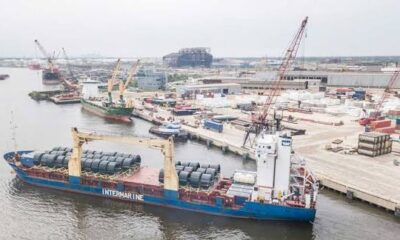Maritime
WMD 2025: Dantsoho Says Protection of Ocean Is Shared Responsibility

BY GBOGBOWA GBOWA
The Nigerian Ports Authority (NPA) has stated that the protection of the ocean which caters for vast marine resources is a shared responsibility, noting that any posturing to the contrary is not only misleading and unacceptable, but also reprehensible.
The Managing Director of NPA, Dr. Abubakar Dantsoho who was speaking at this year’s World Maritime Day (WMD) celebration held at Eko Hotel & Suites, Lagos in a stirring call to action, urged maritime stakeholders to embrace their shared responsibility in protecting the ocean.
Dantsoho who was represented by while giving his goodwill message emphasized the theme “Our Ocean, Our Obligation, Our Opportunity” as a rallying cry for sustainable port operations and environmental accountability.
Dr. Dantsoho’s message, delivered with reverence to the Honorable Minister of Marine and Blue Economy, Alh. Isiak Adegboyega Oyetola, framed the ocean as a silent benefactor whose health underpins global prosperity.
He explained that with over 90% of global trade traversing the seas and maritime activity accounting for half of the world’s economic output, the ocean’s role as a development catalyst is unmistakably clear.
“With over 90 percent of global trade, which accounts for half of the world’s economic output, the maritime industry thereby constitute an important economic driver, that helps to spur development and reduce poverty. Therefore, every member of the maritime, and indeed the global community, is directly or indirectly a beneficiary of the ocean. So, we are all duty bound to become more intentional and deliberate in our responsibility to protect the ocean and its resources.
Beyond fanfare, there is need for every stakeholder here to rise from this celebration with a stronger commitment to take actions that makes the ocean cleaner. Indeed, making global port operations eco-friendlier and actualizing the other noble objectives of the World Ports Sustainability Program rests heavily on our shoulders as maritime stakeholders”, Dantsoho said.

The NPA’s message which went beyond ceremonial platitudes, challenged stakeholders to rise from the celebration with renewed commitment to cleaner oceans and eco-friendly port operations. The World Ports Sustainability Program was cited as a critical framework for achieving these goals, with the NPA pledging continued alignment under the guidance of the Federal Ministry of Marine and Blue Economy.
The Authority’s boss acknowledged the comparative environmental friendliness of sea transport, but stressed that policy alone is not enough.
“We owe posterity a duty to maintain a behavioral pattern that places the highest premium on protecting the ocean.”
The speech called for deliberate, measurable steps to reduce pollution and enhance marine health. It urged institutions and individuals alike to adopt practices that reflect a deep respect for the ocean’s resources and its enduring connection to humanity.
Quoting John F. Kennedy, Dantsoho reminded the audience: “We have salt in our blood, in our sweat, in our tears. We are tied to the ocean.” This poetic reflection underscored the emotional and existential bond between people and the sea, reinforcing the urgency of sustainable action.”
Under his watch, the Nigerian Ports Authority reaffirmed its unwavering commitment to promoting eco-friendly port operations and supporting the broader goals of the Marine and Blue Economy sector.
As the maritime industry continues to evolve, the NPA’s voice at World Maritime Day 2025 serves as a powerful reminder that the ocean’s health is inseparable from its own; thus protecting it is not just good policy but a moral imperative.
“Although, it is good to know as studies have shown that sea transport is the most environmentally friendly of all the transport forms, it is much more important, to acknowledge that we owe posterity a duty, to not only continually formulate and implement policy that protect the ocean, but to maintain as individuals, and institutions a behavioral pattern that places the highest premium on protecting the ocean”, he said.





































